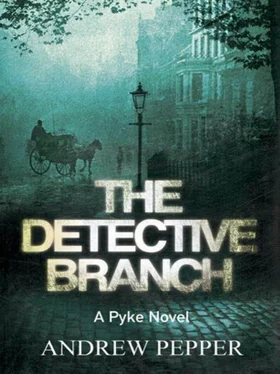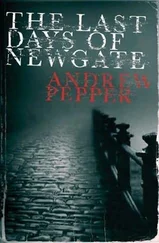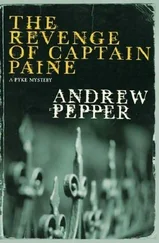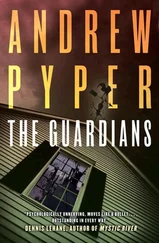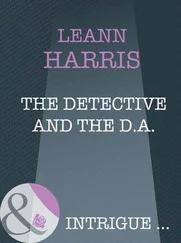Andrew Pepper - The Detective Branch
Здесь есть возможность читать онлайн «Andrew Pepper - The Detective Branch» весь текст электронной книги совершенно бесплатно (целиком полную версию без сокращений). В некоторых случаях можно слушать аудио, скачать через торрент в формате fb2 и присутствует краткое содержание. Жанр: Исторический детектив, на английском языке. Описание произведения, (предисловие) а так же отзывы посетителей доступны на портале библиотеки ЛибКат.
- Название:The Detective Branch
- Автор:
- Жанр:
- Год:неизвестен
- ISBN:нет данных
- Рейтинг книги:3 / 5. Голосов: 1
-
Избранное:Добавить в избранное
- Отзывы:
-
Ваша оценка:
- 60
- 1
- 2
- 3
- 4
- 5
The Detective Branch: краткое содержание, описание и аннотация
Предлагаем к чтению аннотацию, описание, краткое содержание или предисловие (зависит от того, что написал сам автор книги «The Detective Branch»). Если вы не нашли необходимую информацию о книге — напишите в комментариях, мы постараемся отыскать её.
The Detective Branch — читать онлайн бесплатно полную книгу (весь текст) целиком
Ниже представлен текст книги, разбитый по страницам. Система сохранения места последней прочитанной страницы, позволяет с удобством читать онлайн бесплатно книгу «The Detective Branch», без необходимости каждый раз заново искать на чём Вы остановились. Поставьте закладку, и сможете в любой момент перейти на страницу, на которой закончили чтение.
Интервал:
Закладка:
Now the shouts were close by and Pyke could hear an avalanche of footsteps closing in. Wells started to say, ‘I knew you’d come around in…’ Raising the barrel of Gibb’s pistol, Pyke shot him squarely in the face, the rest of the sentence lost in a bloody gurgle. Without hesitation, he turned towards Palmer, who had started to run, and fired the other barrel; the shot hit him on the back of his head and he stumbled forward. The air was thick with the smell of powder, and it was hard to see more than a few paces in front of him. But while no one knew or could see what had really happened, Pyke knew the smoke would clear quickly and the others would soon be upon him. Bending down, he put the pistol back into Gibb’s hand and, retrieving his own weapon, he held it up in the air and shouted, ‘Three men down. Gibb shot Wells and Palmer, I got here too late. He tried to run; I didn’t have a choice.’
Domine, dirige nos.
Lord direct us.
Pyke let his pistol slip through his fingers and it clattered on to the hard, polished floor. Then there were four, five, six men around him, policemen in uniform shouting at him to yield, the ripe, acrid smell of blood.
THIRTY
The immediate aftermath of the shootings was swift and momentous; with Palmer, Wells and a policeman dead, rumours swirled uncontrollably among the guests that a murderer with a lust for blood was still rampaging through the building, and five hundred guests fought with one another and the army of policemen to escape from the building. Wealthy men wearing satin cravats, silk neckties and velvet waistcoats trampled over panicking women who could barely move in their elaborate crinoline skirts, frantic to reach their carriages and broughams, backed up all the way along King Street and Aldermanbury. It would have been amusing to watch except for the fact that the guests included some of the most powerful figures in the country, not least the prime minister, the home secretary and, as it turned out, both Metropolitan Police commissioners. This meant someone had to shoulder the blame, and quickly, and without it being agreed in any formal sense, Pyke was selected for this role. It helped that he was still wanted on another charge. Very soon the whole debacle, the crushing humiliation it heaped upon the New Police, was dumped at Pyke’s feet.
Escorted by a phalanx of policemen overseen by Rowan himself, Pyke was pushed into a fortified police carriage and transported to Great Scotland Yard, where he was locked in a cell while Rowan and Mayne decided on the best way to proceed. For the next three days, Pyke was questioned over and over about his role in the proceedings and asked to explain why a man they all knew as Detective Sergeant Edward Lockhart had killed not just Walter Wells and Sir St John Palmer but also Isaac Guppy and Charles Hogarth. Unsurprisingly, Mayne and Rowan were not happy with Pyke’s answers, and at first didn’t believe him. They wanted proof, hard evidence, which Pyke was unable to provide. But after recounting the events for the fourth or fifth time, even Pyke’s severest critics had to concede that there was some truth in his version. And bit by bit, elements of his story were confirmed: that Lockhart was in fact Luke Gibb; that Luke Gibb had been the half-brother of Morris Keate; that Gibb’s brother John had been one of the victims in the Shorts Gardens robbery. This left Pyke’s inquisitors in a difficult position. With a welter of circumstantial evidence indicating that Gibb had good reasons for wanting Palmer and Wells to suffer, they couldn’t very well charge Pyke with the murders, even though some in the executive department believed that Pyke had in fact pulled the trigger himself. Nor could they pat him on the back and congratulate him on a job well done, or dismiss him from his position with immediate effect — he knew too much and he could go to the newspapers with what he knew, causing lasting damage to both the Church and the police. No one wanted this, least of all the prime minister, who had taken a personal interest in the situation.
Palmer had been a friend of the police department. But now his role in the fraud was becoming clear, his supporters were running for cover. Later, Pyke was told that Wells had introduced Palmer to Mayne and had arranged for Palmer’s company to secure the contract to refurbish the station house at Scotland Yard. He was also told that Sergeant Mark Russell had been found in his bed, shot in the face.
Pyke’s circumstances improved further when it became apparent that the charges against him regarding the theft of the Saviour’s Cross and the apparent murder of Billy Sharp were not going to stand up. With Wells dead, the case against him quickly fell apart. First, Ned Villums withdrew his evidence, then Alfred Egan followed. The gaoler admitted that Wells had offered him money to testify against Pyke and finally Pyke’s neighbour Leech admitted that he had not witnessed Pyke bury the Saviour’s Cross. At the same time Leech put his house up for sale and Pyke never saw him or his dog again. In the end, Mayne and Rowan had no choice but to let Pyke go free and, with the charges against him shown to be not only false but concocted by a fellow policeman, they couldn’t very well do what they may have wanted to and dismiss Pyke from his position. Instead they suspended him temporarily, pending a hearing, which was set for a week’s time.
Throughout his extensive questioning Pyke had never made it clear to his inquisitors what he wanted, though he did occasionally hint that the price he was likely to demand would be more than they were prepared to pay. He knew, however, that his success or failure in this respect depended on him finding the true Churches Fund accounts.
That week was cold and bright and, having collected Felix from Martin Jakes’s care and returned to their Islington home to be reunited with Copper — who was both excited to see them and disgruntled by their absence — Pyke kept Felix out of school and they spent a couple of afternoons together in the garden erecting a new shelter and sty for the two remaining pigs. They didn’t talk about the conversation they’d had in Jakes’s vicarage but Pyke tried to show the lad a gentler side of his character.
Pyke made only two trips. The first, to the New Prison in nearby Pentonville, was short and unsuccessful. He went there to persuade Druitt to give up the location of the true Churches Fund accounts, if indeed he knew where they were, but all Druitt seemed to want to do was discuss Paradise Lost.
‘Why, according to Milton, did Satan rebel against his maker?’ Druitt swung lazily on his hammock. ‘It was, we are told, because he saw no reason for the extreme inequality of rank and power which God had assumed.’
‘I know Gibb visited you here on a number of occasions. I need you to tell me where the accounts ledger is. The one that was stolen from the archdeacon’s safe.’ Knowing what he had done to Sarah Scott, Pyke could barely look at the man.
Druitt didn’t appear to have heard him. ‘Of course, Satan, who presents a case against tyranny, also became a tyrant himself. Perhaps this was inevitable. Still, I don’t know about you, Detective Inspector, but I would take the earthy rambunctiousness of Pandemonium over the austere dictatorship of Heaven every time.’
Pyke no longer had the patience for these games and he turned to leave.
‘You’ve disappointed me, Detective Inspector. I had higher hopes for you, to be quite frank.’
Pyke stopped and stood facing him, his back to the door.
‘I thought you’d want to rock the boat, at the very least; I’ve heard stories about you. I didn’t think that you’d lie down and roll over; whimper in the face of authority. I have to admit, I’m very disappointed.’
Читать дальшеИнтервал:
Закладка:
Похожие книги на «The Detective Branch»
Представляем Вашему вниманию похожие книги на «The Detective Branch» списком для выбора. Мы отобрали схожую по названию и смыслу литературу в надежде предоставить читателям больше вариантов отыскать новые, интересные, ещё непрочитанные произведения.
Обсуждение, отзывы о книге «The Detective Branch» и просто собственные мнения читателей. Оставьте ваши комментарии, напишите, что Вы думаете о произведении, его смысле или главных героях. Укажите что конкретно понравилось, а что нет, и почему Вы так считаете.
